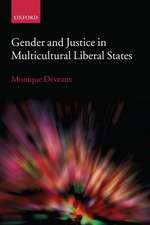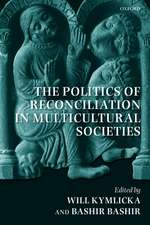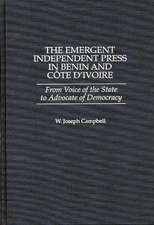England's Citizenship Education Experiment: State, School and Student Perspectives
Autor Lee Jeromeen Limba Engleză Paperback – 9 apr 2014
| Toate formatele și edițiile | Preț | Express |
|---|---|---|
| Paperback (1) | 258.42 lei 6-8 săpt. | |
| Bloomsbury Publishing – 9 apr 2014 | 258.42 lei 6-8 săpt. | |
| Hardback (1) | 832.65 lei 6-8 săpt. | |
| Bloomsbury Publishing – 24 oct 2012 | 832.65 lei 6-8 săpt. |
Preț: 258.42 lei
Preț vechi: 295.87 lei
-13% Nou
Puncte Express: 388
Preț estimativ în valută:
49.46€ • 51.19$ • 41.80£
49.46€ • 51.19$ • 41.80£
Carte tipărită la comandă
Livrare economică 05-19 martie
Preluare comenzi: 021 569.72.76
Specificații
ISBN-13: 9781472569134
ISBN-10: 147256913X
Pagini: 208
Dimensiuni: 156 x 234 x 15 mm
Greutate: 0.41 kg
Editura: Bloomsbury Publishing
Colecția Bloomsbury Academic
Locul publicării:London, United Kingdom
ISBN-10: 147256913X
Pagini: 208
Dimensiuni: 156 x 234 x 15 mm
Greutate: 0.41 kg
Editura: Bloomsbury Publishing
Colecția Bloomsbury Academic
Locul publicării:London, United Kingdom
Caracteristici
Analyses England's citizenship education policy within the wider context of New Labour's domestic policy programme.
Notă biografică
Lee Jerome is Programme Director Secondary Initial Teacher Education at London Metropolitan University, UK.
Cuprins
Introduction1. Thinking about CitizenshipPart I: Thinking about Citizenship Policy 2. Studying Education Policy3. Imagining the New Citizen4. The New Citizen in Education PolicyPart II: Implementing the Vision5. Citizenship: More and Less than a Subject6. Teaching Citizenship7. Learning Citizenship8. Rights and Responsibilities9. Community and Diversity10. Active CitizenshipPart III: Conclusions11. New Labour, New Citizens?ReferencesIndex
Recenzii
Lee Jerome is well placed to describe the journey that citizenship education has taken; he is rooted in the subject and the initial training of teachers in it. However, what makes this book so fascinating is that it not only provides the sweep of the history of citizenship education but puts this into a political context; that of the New Labour period of office . Jerome is to be congratulated on this volume. It is highly readable, provocative and informative.
Citizenship was introduced as a statutory subject of study in British secondary schools in 2002, and Jerome (secondary initial teacher education, London Metropolitan U.) looks at the first ten years of experience with it. He investigates what kind of citizenship education the New Labour government had in mind and how it fits in with the party's broader reform and modernization agenda, and what kind of citizenship education actually happened as a consequence of the policy. Among his topics are studying education policy, imagining the new citizen, teaching and learning citizenship, rights and responsibilities, community and diversity, and active citizenship.
This is a book that is both highly readable and scholarly. Lee Jerome combines an astute understanding of political theory and of policy with a practitioner's feeling for the realities of schools and classrooms. He uses original and innovative research techniques to gain access to the voices of students and provides a masterly account of a policy enactment that has been observed with interest across the world.
After ten years of statutory citizenship education in UK secondary schools, Jerome analyses this program of study by delicately weaving together the complex historical, political, educational and pedagogical variables involved. Conversations with teachers and the involvement of students as ethnographic researchers reveal moving, eye-opening, real-life transformations, challenges and complexities of learning and teaching citizenship in the UK. Jerome inspires a series of inclusive, participative and fundamental methodological frameworks for conducting country case studies around the world examining policy and practice of citizenship education.
Lee Jerome provides a scholarly but readable account of the implementation of citizenship education in England which will be of interest both to those who were part of the process and those who are new to it. One innovative feature is the inclusion of student perspectives.
Lee Jerome successfully argues that any developments in education cannot be separated from the political context in which policies emerged. Throughout the book he provides evidence and examples to emphasise the importance of always critically examining the prevailing political context . This book would be a superb key text for those working in sociology and education research fields who wish to learn more about the impact of political context on citizenship education policy in schools, on teachers and on students.
Citizenship was introduced as a statutory subject of study in British secondary schools in 2002, and Jerome (secondary initial teacher education, London Metropolitan U.) looks at the first ten years of experience with it. He investigates what kind of citizenship education the New Labour government had in mind and how it fits in with the party's broader reform and modernization agenda, and what kind of citizenship education actually happened as a consequence of the policy. Among his topics are studying education policy, imagining the new citizen, teaching and learning citizenship, rights and responsibilities, community and diversity, and active citizenship.
This is a book that is both highly readable and scholarly. Lee Jerome combines an astute understanding of political theory and of policy with a practitioner's feeling for the realities of schools and classrooms. He uses original and innovative research techniques to gain access to the voices of students and provides a masterly account of a policy enactment that has been observed with interest across the world.
After ten years of statutory citizenship education in UK secondary schools, Jerome analyses this program of study by delicately weaving together the complex historical, political, educational and pedagogical variables involved. Conversations with teachers and the involvement of students as ethnographic researchers reveal moving, eye-opening, real-life transformations, challenges and complexities of learning and teaching citizenship in the UK. Jerome inspires a series of inclusive, participative and fundamental methodological frameworks for conducting country case studies around the world examining policy and practice of citizenship education.
Lee Jerome provides a scholarly but readable account of the implementation of citizenship education in England which will be of interest both to those who were part of the process and those who are new to it. One innovative feature is the inclusion of student perspectives.
Lee Jerome successfully argues that any developments in education cannot be separated from the political context in which policies emerged. Throughout the book he provides evidence and examples to emphasise the importance of always critically examining the prevailing political context . This book would be a superb key text for those working in sociology and education research fields who wish to learn more about the impact of political context on citizenship education policy in schools, on teachers and on students.


















